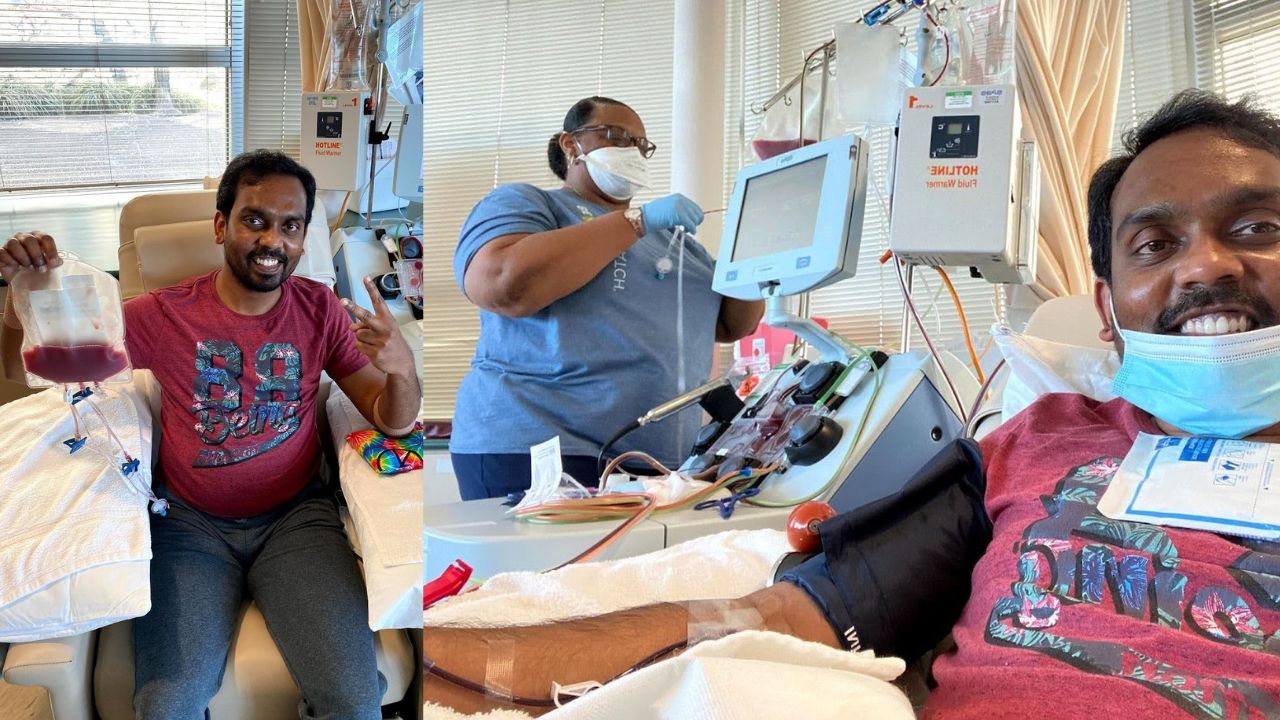This is the tale of a single person who, in the midst of a grave and lasting incident that will affect future generations, was inspired to make a difference in the world.
In 2013, Abhishek Padmanabhuni, a native of Hyderabad, Telangana, moved to the US to complete his postgraduate studies in information technology. Community service has always motivated him, and since he was a teenager, he has volunteered to support the neighbourhood by planning blood drives, planting trees, and launching environmental awareness campaigns. He thinks that his family’s and his parents’ values have helped him to always feel that giving back to society is the most important thing one can do in life.
Abhishek attended an online meeting organised by the Silicon Andhra Rotary Club in September 2020. Speakers on stem cell donation were invited by the club. The presenters covered a wide range of topics and related anecdotes from the South Asian diaspora about their struggles to find compatible donors. The lengthy search for a donor during the patient’s gruelling cancer treatment makes the procedure even more taxing on the patient and their close relatives. He heard several presenters during the educational webinar explain how simple it is to save the life of someone battling cancer and the procedures involved. The presenters covered a wide range of topics and spent time dispelling some common misconceptions. They began by explaining what stem cell donation is, the differences between patients and donors in the registry, the work of the non-profit organisation Be The Match, which has its headquarters in Minnesota, USA, and how it helps many cancer patients by matching them with compatible donors, bone marrow donation, and a few anecdotes from donors and survivors. Five months after attending the webinar, Abhishek would have the chance to see firsthand how one person can impact the destiny of another Indian.
After some thought, Abhishek went to the Bethematch.org website at the beginning of October to place an order for the swab kit, which is used to take a person’s sample in order to add them to the registry of donors who share similar goals. He neglected to send his sample because he was taking care of a newborn at home at the exact moment he wanted to send it. All of this occurred during a peak season when COVID-19 was widespread and vaccine trials were still in progress. He was putting off returning the swab kit to Bethematch because he was unsure of how to handle the situation after ordering it a few weeks ago. He ordered the return of a replacement kit after realising after a while that the swab kit he had packed a few weeks earlier had gotten wet. By the time he received the replacement kit in early December, he was resolved to return it without hesitation this time.
He was shocked to learn on January 14th, approximately three weeks after mailing the swab kit, that he was an 85% match for one of the leukaemia patients from the Bethematch team. It was an epiphany to realise that a patient had been waiting for help for a while.
He had to face the fact that he had to take care of a newborn at home and that something bad might happen if he proceeded, even though he was very determined to help someone at this crucial moment. His spouse encouraged him to move forward with the donation and offered support when he talked about the tough choice he had to make.
The process of donating stem cells is relatively simple and similar to donating blood, but it takes a little longer because of the complications in isolating the stem cells from the blood. During the donation, the donor receives the blood and plasma back into their body, and the recipient receives the stem cells, which are collected in a bag. Because of the stringent COVID-19 protocols in effect at the time, Abhishek had to travel from the Bay area of California to San Antonio, Texas, in order to donate stem cells. Abhishek donated his stem cells on February 21st, coinciding with the Great Texas Freeze, a deadly weather event that caused statewide power grid blackouts and disruptions to daily life. His family and a few close friends generously offered to assist during this difficult time.
This whole experience has been fulfilling and transformative for Abhishek. He is appreciative of everyone who helped him along the way. Thankfully, his recipient lived to tell the tale and is now cancer-free. He is aware that his stem cell recipient is a female Indian living in the US who has overcome a severe case of Lukemia, even though he has not met her.
In an attempt to save more cancer patients, he hopes that his message will reach a larger Asian and Indian diaspora. He documented his stem cell donation experience on YouTube at https://www.youtube.com/watch?v=fywx79NIa-A.
Some Rotary International clubs, IACAN (Indian American Cancer Network), and Bethematch.org are still working hard to raise awareness of this cause. You can read about his donation story in the Rotary magazine, which was published recently, at https://www.rotary.org/en/fair-chance-cure.
Given the large discrepancy between the number of Indian cancer patients and the extremely small number of donors in their registry, Bethematch welcomes prospective Indian donors.
Regretfully, a lot of Indian patients still hunt for compatible donors, and one of the main obstacles to the process of registering more donors in the registry is the misconceptions surrounding stem cell donation.
More information on stem cell donation and the requirements for a donor can be found here: The blood stem cell donation process and recovery time.


